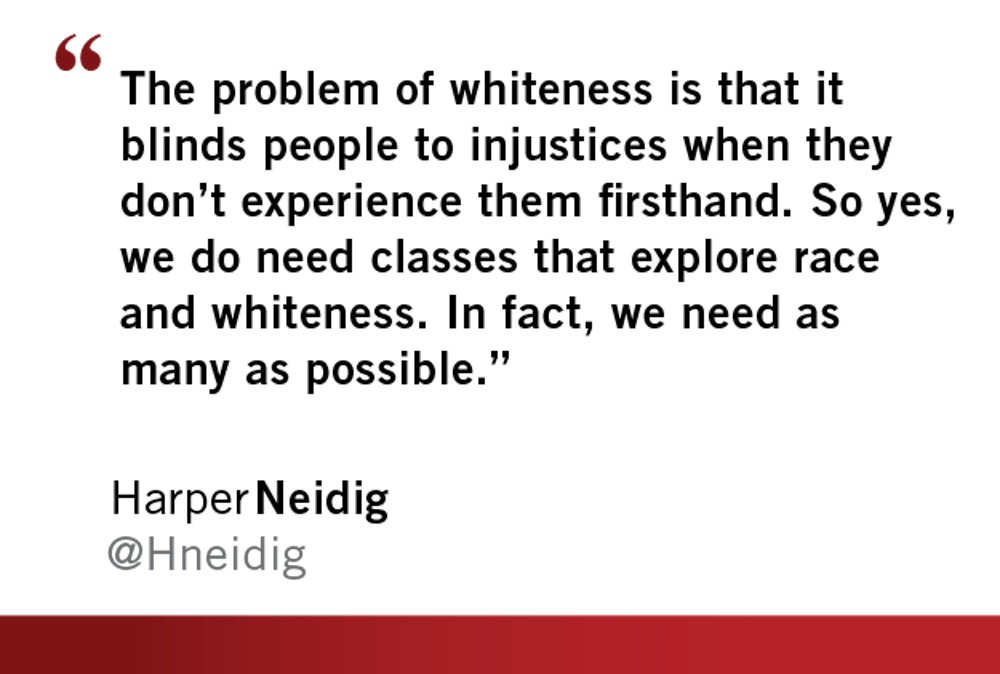ASU has recently become the target for conservative outrage over a course being offered this semester called “U.S. Race Theory & the Problem of Whiteness.” Last week, journalism student Lauren Clark appeared on the show “Fox & Friends” to express her shock that anyone would dare suggest that white people are to blame for social injustices.
Let’s ignore for the moment how moronic it is to worry about white people being oppressed in the U.S., and instead focus on Clark’s claims. If she had taken 10 minutes to search “race theory” on Google before embarrassing our university on national television, she would have discovered that the course’s title is not suggesting that there is a problem with white people, but rather it is referring to whiteness as a socially constructed phenomenon.
Race is not a biological truth, it is a concept that society has created over time through subjugation and exploitation. When we talk about the "problem of whiteness," it’s important to examine our nation’s history. The very foundation of the U.S. is rooted in white supremacy. Our constitution endorsed slavery by giving slave owners greater political power through the Three-Fifths Compromise. Our greatest economic asset until the Civil War was the cotton industry, the prosperity of which was utterly reliant on treating human beings as property.
Read the opposing column "What IS 'the Problem of Whiteness'" here.
However, the abolition of slavery did not guarantee freedom for African-Americans, as whites in the South spent the next century devising ways to prevent former slaves and their descendants from achieving the political rights that are promised to American citizens. Segregation, poll taxes, unfair literacy tests and terrorism were just some of the ways that white southerners came up with to suppress blacks and maintain their supremacy.
The exploitation of black people was not confined to the southern states, it was a nationwide tradition. The New Deal — FDR’s initiative that lifted the U.S. out of the Great Depression — largely excluded black people. When black veterans returned home from World War II, many found that they would be denied the benefits of the G.I. Bill that were given to white veterans. Black middle-class families were exploited by a predatory housing market that prohibited them from getting legitimate loans.
Our history of discriminatory policies has had long-term effects on our society and has created this problem of whiteness. It’s why the current level of wealth inequality between white and black households in the U.S. is greater than it was in South Africa during apartheid. It’s why black people are just as likely to use illegal drugs as white people, but three times more likely to be arrested for it. It’s why black and Latino children are less likely to be taught by qualified teachers. Most importantly, the problem of whiteness is that it blinds people to these injustices when they don’t experience them firsthand. So yes, we do need classes that explore race and whiteness. In fact, we need as many as possible.
Today, we often remember the Civil Rights Movement as something that solely targeted the obvious discrimination in Jim Crow states, and through this perspective it is easy to dismiss racism as a disease that was cured a long time ago. We are still plagued with prejudice in our schools, in our businesses and in our legal system.
So when Fox News accuses ASU of offering a racist class simply because it explores race, it is emblematic of a larger problem. All too often, our discomfort with the issue along with our collective historical amnesia prevents us from having an honest dialogue about racial equality in America. But we have a responsibility to confront these problems and be truthful when thinking about our racist national heritage.
Reach the columnist at hneidig@asu.edu or follow @hneidig on Twitter.
Editor’s note: The opinions presented in this column are the author’s and do not imply any endorsement from The State Press or its editors.
Want to join the conversation? Send an email to opiniondesk.statepress@gmail.com. Keep letters under 300 words and be sure to include your university affiliation. Anonymity will not be granted.
Like The State Press on Facebook and follow @statepress on Twitter.





